Thousands of people turned up for climate strikes across Aotearoa New Zealand today — and briefly staged a sit-in at Christchurch City Council.
School students and others around the country protested for climate change action from the government.
School Strike 4 Climate Christchurch spokesperson Aurora Garner-Randolph, 17, said she expected between 15,000 to 20,000 people to participate.
After the fallout from the Auckland floods and the devastating effects of Cyclone Gabrielle across the North Island, the organisers of the protest have five demands, including no new fossil fuel mining or exploration and a rebate for e-bikes.
Other demands include greater marine protection, funding a transition to regenerative farming and lowering the voting age to 16.
Earlier this evening in Christchurch, young climate activists breached the doors of the city council offices and staged a sit-in.
One of the organisers for School Strike for Climate Ōtautahi, Aurora Garmer-Ramdolph, said the group had been planning to protest at the council’s office for a while.
‘Strike protests a long time’
“We feel that we’ve been having these strike protests for a long time now.
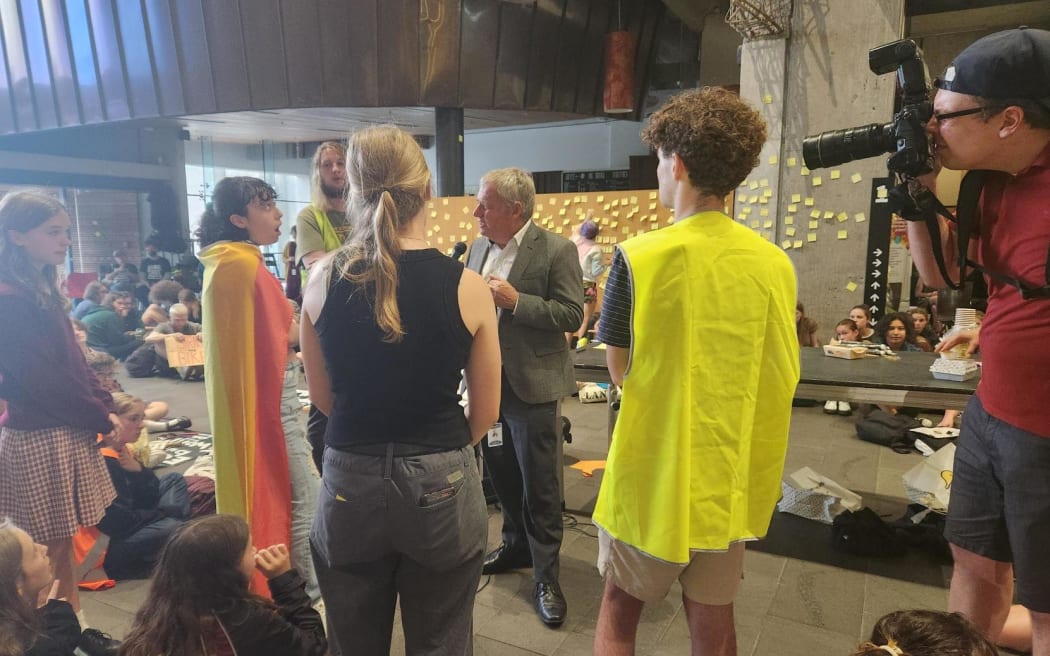
“Young people, people of all generations have been showing up in the streets to protest for climate action and we’re not seeing the change that we need, so we’ve decided to step it up this time. We decided to come directly into the Christchurch City Council.”
Garmer-Ramdolph said the group’s key demand is that the council retracts its support for the proposed new international airport at Tarras in Central Otago.
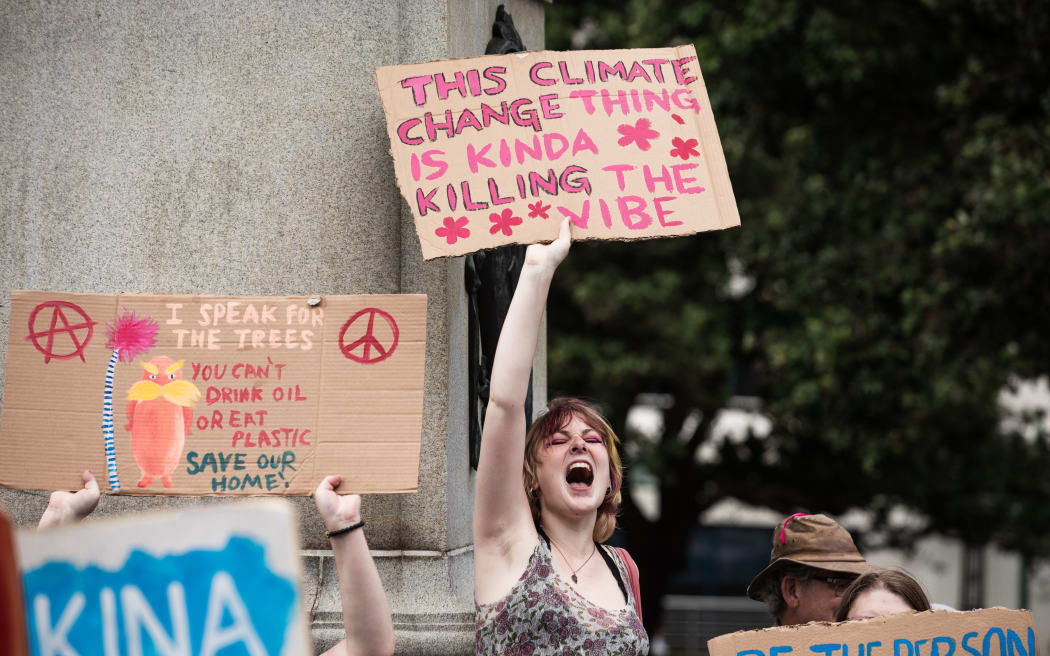
More than 1000 people of all ages joined the Wellington march, which arrived at Parliament in the afternoon.
Speaking after the march to Parliament, Te Umanako Waa said the horrific weather events of the last few weeks should be a wake-up call for those in authority.
“I feel like the facts are in their face. The students, the people, everyone is telling them what needs to be done.
“If the response for covid can happen this quick surely the response for a worldwide disaster, a natural breakdown, can happen too.
“It’s really important that we hold our leaders to account.”
Time for politicians to take notice
Waa said it was time for politicians to take notice of what their citizens were telling them.
The crowd of protesters, who were mainly young people, stretched half the length of Lambton Quay, with shoppers stopping in doorways to watch them pass, some breaking into spontaneous applause.
In Auckland, the march began at Britomart Station and went to Victoria Park, where a concert continued until 7pm.
Addressing the crowd at the Auckland march, the co-president of Unite Union Xavier Walsh said the government had failed to deliver the radical change needed to tackle the climate crisis.
“Plans by the opposition, such as to reopen deep sea oil drilling, would make the situation even worse — and that is a shame.
“So I say to the Labour and National parties, I can smell the fossil fuels on your breath!”
Walsh said real change will only come from ordinary people standing together and refusing to accept injustice.
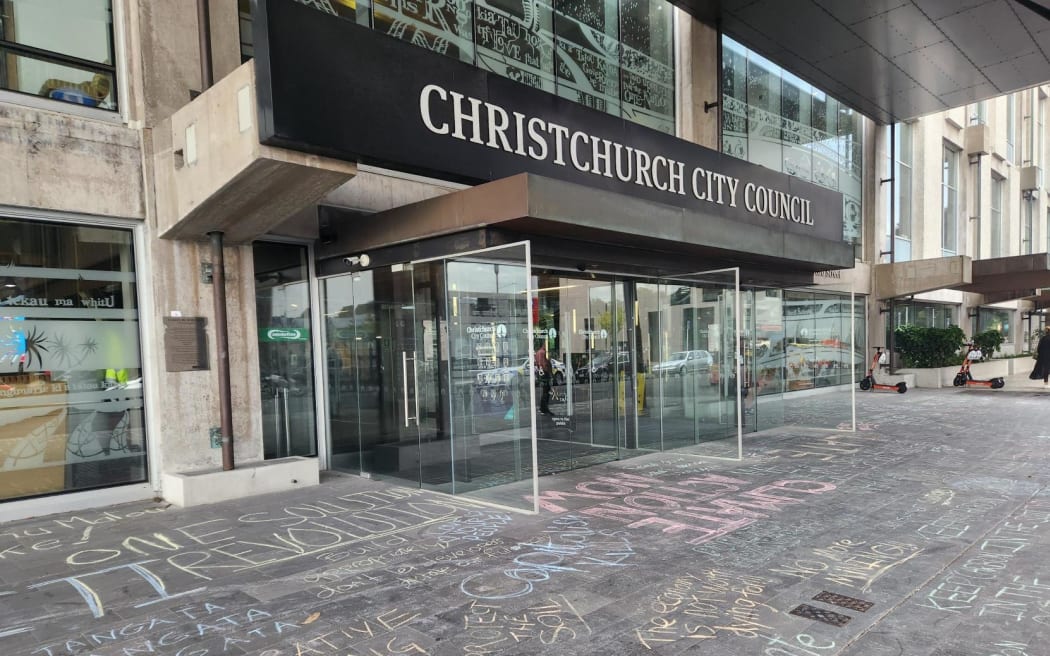
Auckland Transport warned of delays
Auckland Transport said more than 1000 people were expected to march in the city. Public transport users could also expect detours, cancellations and delays.
In Wellington, the protesters marched down Lambton Quay before gathering at Parliament.
Student Breeana was among them.
She told RNZ it was important to protest for a better future.
“Most people in the older generation assume we do it … well, I’ve had a lot of people say you’re just doing this to get out of going to classes.
“We have to grow up with this. This is our future that we’re trying to prepare for and our planet. We don’t have another option.”
Wellington Mayor Tory Whanau was also among them.
She used the opportunity to tell the crowd in order to get climate justice, the right politicians needed to be voted into central government.
“Now I know that your Minister for Climate Change is listening. I know he backs the kaupapa. So my message to you, this year, it is election year.
‘Vote for environment parties’
“So if you can vote, make sure you vote for the parties that put the environment at the top of their priorities.”
Students also gathered near Nelson’s church steps as part of the global climate strike calling for change.
Garin College student Nate Wilbourne said they were demanding transparent and meaningful climate action from decision-makers.
He said the evidence of climate change was clear.
Nate Wilbourne said teenagers had many concerns about the environment.
Climate strikers wanted to see real commitment to achieve climate goals from policy and decision makers, Wilbourne said.
They marched to the Nelson City Council buildings this afternoon to present a letter to Mayor Nick Smith calling for free public transport, he said.
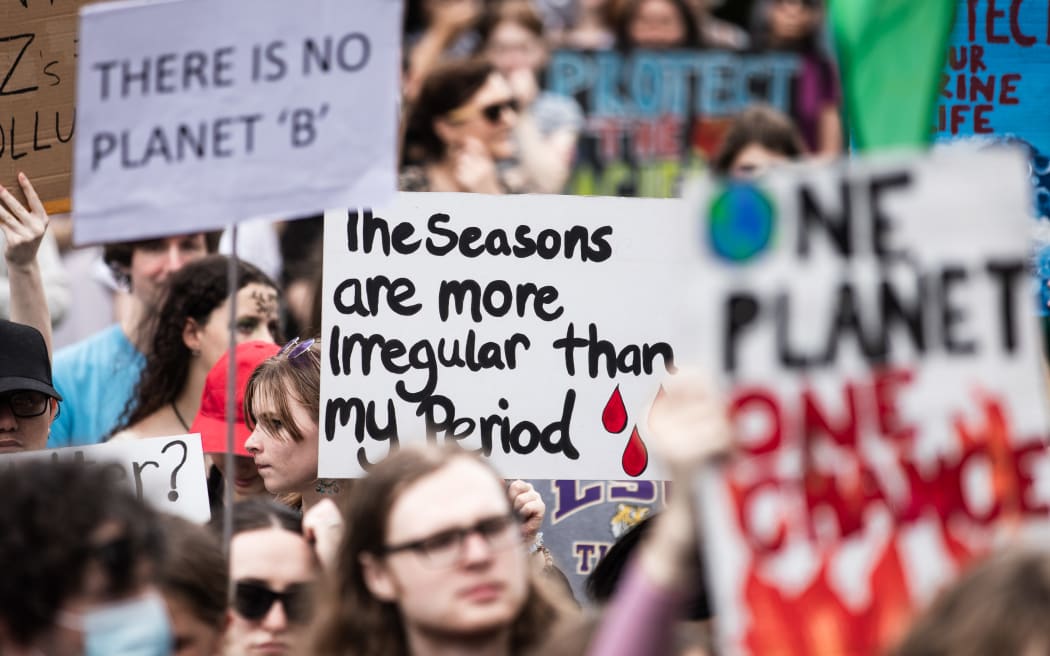
‘This is going to be a climate election’ – Greens co-leader
Labour will have to commit to stronger climate change policy if it wants the Green Party’s support come election 2023, Greens co-leader James Shaw said.
Shaw made the comments to reporters on Parliament’s forecourt after speaking to climate inaction protesters.
“Frankly, this election is going to be a climate change election and it is clear from the experience that we’ve had over the course of the last month that we’re now living in an age of consequences,” he said.
“I think if any political party wants the Greens’ support they’re going to have to come to the table.”
Shaw said he could not imagine a scenario where he would choose to work with the National Party over Labour.
“If you look at National’s track record in the last 20 years on climate change it’s frankly appalling and while they say that they’re committed to the targets we’ve committed to, they’ve actually voted against every single policy we’ve put in place to meet those targets without proposing alternatives.”
Shaw said he hoped everyone, including politicians from all parties, would support stronger climate policy in the wake of terrible weather events.
Cyclone ‘wake up’ call for politicians
“I really hope that if anything, the experience that people have had of the cyclone and the floods in such close proximity will cause politicians to wake up and start to take it seriously and treat it at the level of emergency that it actually is.”
Speaking from Christchurch on Friday, Prime Minister Chris Hipkins said the government was making a lot of progress on many of the topics students were striking about.
“Climate change has been at the forefront of the government’s agenda for the past five years and it will continue to be so,” Hipkins told reporters.
“If you look at the emissions reduction plans that we’ve already set out, you can see that we’re making significant progress — of course we’ve still got some heavy lifting to do though, there’s no question about that and the government’s absolutely committed to doing it.”
There was no question we were seeing the effects of climate change here and now, Hipkins said.
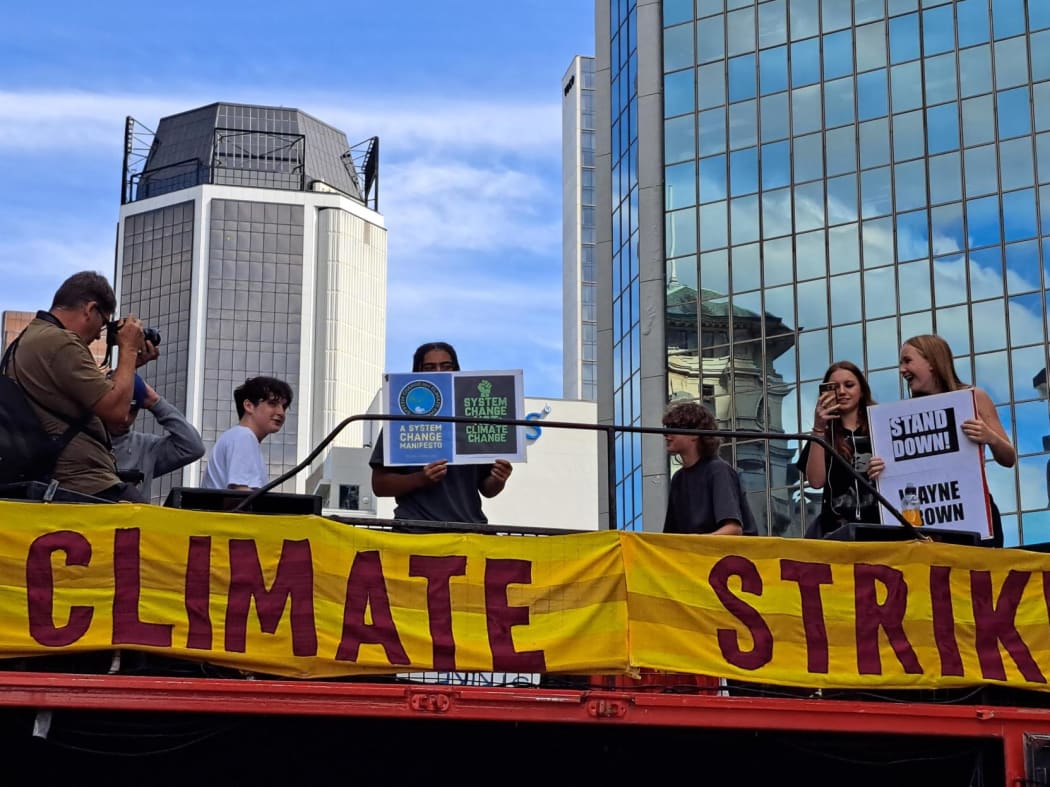
“What’s happened with our flooding, with the cyclone, we’re going to see more of these sorts of events, and that just I think underscores to New Zealand how important it is that we do two things: one is that we do everything we can to reduce climate change, the human-induced effects on the climate,” he said.
“The second is that we also look at how we can be more resilient and how we can make sure that we’re adapting to accept that actually there are going to be more of these sorts of events in the future.
‘It doesn’t happen overnight’
“Many of the things that are going to make the biggest difference to our emissions are going to take some time, so when we think about transitioning to more renewable energy use … that doesn’t happen overnight, it requires some hard work and some ongoing work to make that happen.”
On the voting age, he said people should expect to hear something further on the government’s intentions on that soon.
“The courts made a ruling, Parliament now has to consider that, that’s been referred to a select committee for consideration. How the government ultimately responds to that process is something that we will turn our minds to in due course.”
In November last year, the Supreme Court declared the voting age of 18 inconsistent with the Bill of Rights Act. Any change would require the backing of three quarters of MPs, or a majority vote in a referendum.
New Zealanders on average in 2021 produced 6.59 tonnes of carbon dioxide each — about 40 percent above the world average, according to the Our World In Data Global Carbon Project.
Climate Action Tracker, an international project which rates countries’ efforts towards meeting their climate obligations, ranks New Zealand’s efforts overall as “highly insufficient”.
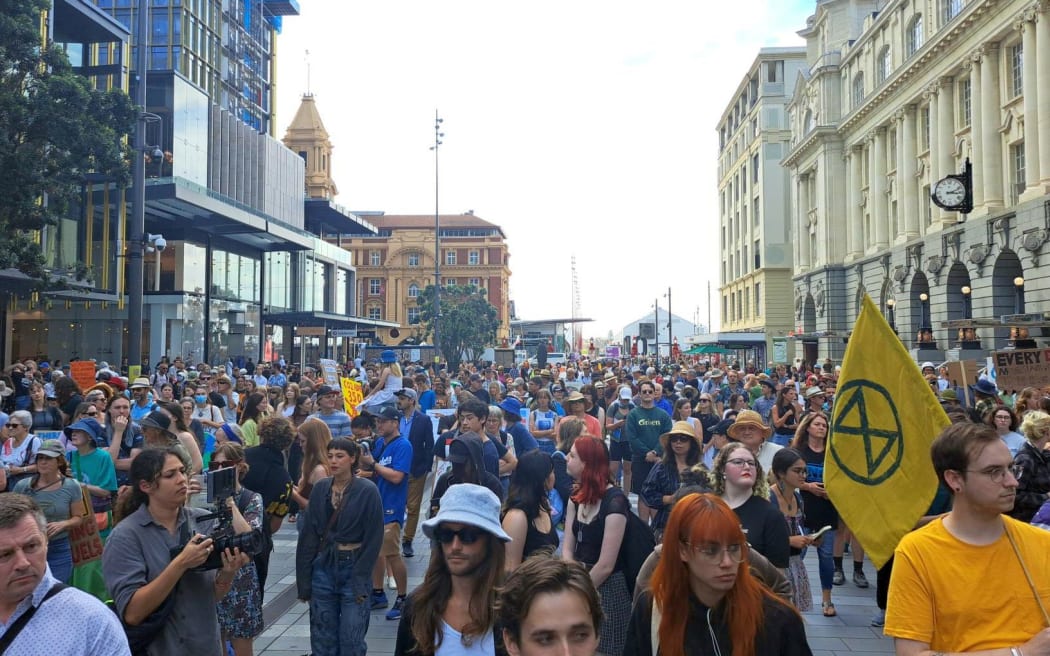
New Zealand’s farming industry also produces a lot of methane, which though it does not remain in the atmosphere as long as CO2, traps a lot more heat.
‘No time for finger-pointing’
But the country’s small population meant it contributed only about 0.09 percent of the world’s total C02 emissions.
Garner-Randolph said it did not matter that Aotearoa only accounted for a tiny fraction of the world’s emissions.
“Now isn’t the time for finger-pointing and saying, ‘Oh other countries are producing far more emissions.’ It’s our responsibility as global citizens, as players on the global stage, to step up and do our part, no matter how big or small it is.
“And we have incredibly high per capita emissions here in Aotearoa, so although we may be small, we are high individual emitters and that needs to change.”
The last school climate strikes took place in September.
This article is republished under a community partnership agreement with RNZ.
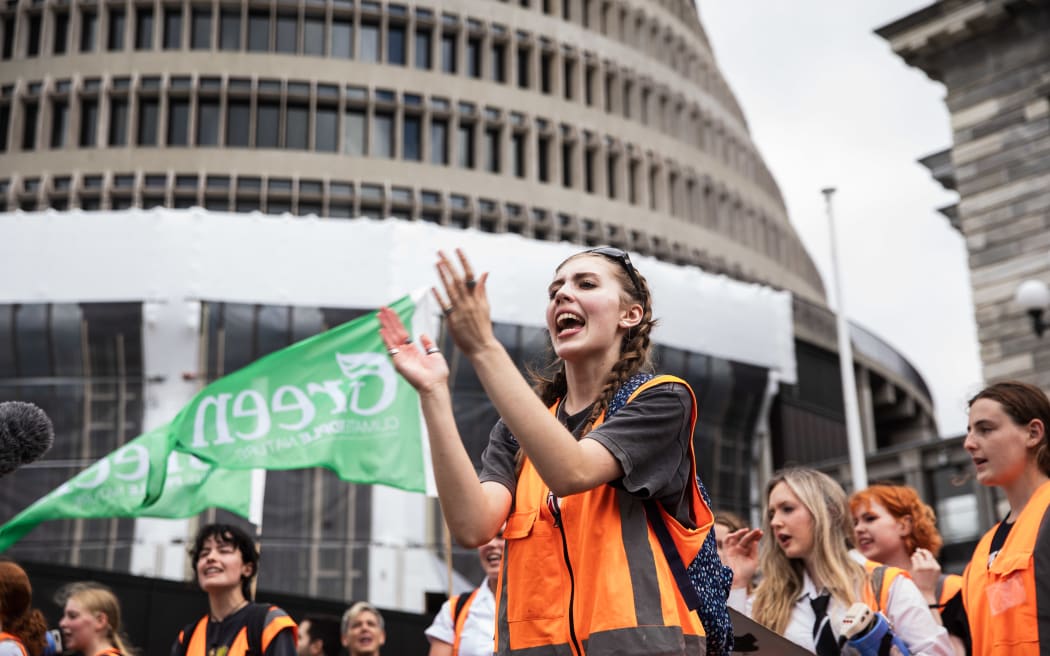
Article by AsiaPacificReport.nz






